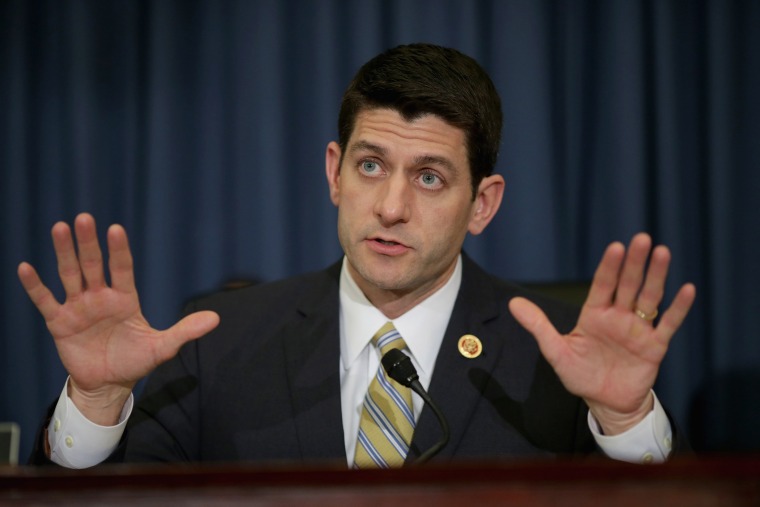In his speech last week at the Conservative Political Action Conference (CPAC), House Budget Committee Chairman Paul Ryan (R-Wis.)
rejected the idea that his party was in the midst of a "civil war." He told the far-right activists, "I don't see this great divide in our party."
Ryan stressed the same point on "Face the Nation" yesterday. "I don't think there's really this vast civil war in the Republican Party like many in the left like to suggest there is," the congressman
said. "I think we're a party with a vibrant debate, adding ideas, solving problems, and I think we're going to be okay."
Metaphors can be tricky and if Ryan is uncomfortable with "civil war" references, his concerns are not without merit. In a civil war, there are generally two well-defined contingents struggling for control, but what Republicans have are multiple factions looking for power, but lacking in leadership and direction.
Robert Costa's post-CPAC
report framed the landscape well.
The annual Conservative Political Action Conference came to a raucous and buoyant end Saturday as thousands of tea party activists cheered on former Republican vice-presidential nominee Sarah Palin, who closed the gathering with a full-throated denunciation of President Obama and urged conservatives to embrace their views more fiercely than ever. But over the course of its three days, the event put on display how factions within the Republican Party are still struggling to find a path out of the wilderness, illuminating the gap between the GOP's resolutely conservative grass-roots and a party leadership eager for a more moderate approach.
It became clear at CPAC that Republicans are united in their contempt for President Obama ... but that's about it. What's the Republican line on foreign policy? Ask different figures in the party and you'll get very different answers. What should Republicans do about immigration? There's no shortage of opinions, many of which contradict each other.
What role should social issues play in the GOP's agenda? Should the party try to be more inclusive? Should the focus remain on repealing the entirety of the Affordable Care Act? Who's leading the party and in what direction? No one, inside CPAC or out, seems to have the foggiest idea.
Dana Milbank
added that the party isn't struggling through a "civil war" so much as it's dealing with "a free-for-all."
The conservative movement is united in one way: its antipathy toward anything that has to do with President Obama. In the 2014 midterm elections, that will likely be enough to allow Republicans to keep the House and possibly win the Senate. But their shared opposition to Obama masks disagreements over who will lead the party and where it will go.
Note that Ryan added yesterday that he's confident that his party is "going to be okay," the intra-GOP divisions notwithstanding. And if recent polling is any indication, that's very likely true -- much of the country is indifferent to the Republican in-fighting. The electorate is deeply unsatisfied with the status quo and may very well take out their frustrations on the president and his party, whether or not they're to blame, whether or not that makes sense.
To this extent, Republicans find themselves in a curious position. To its great satisfaction, the party is poised to acquire more power in the short term. It just doesn't know what to do with it.
